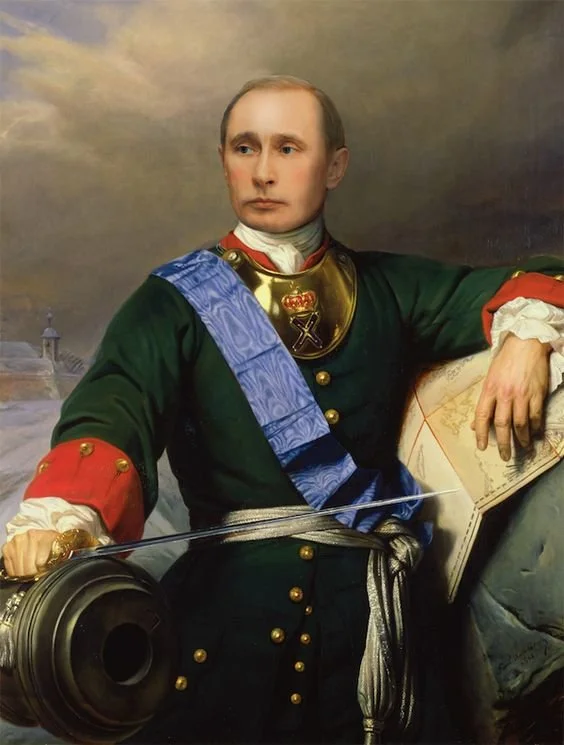Putin’s View of History
Image belongs to R U on Pinterest
Winston Churchill once described Russia as “a riddle wrapped in a mystery inside an enigma”. After twenty-two years of Vladimir Putin in power, it’s safe to say that much of the enigma remains. Putin can certainly be a difficult man to read. Described by George W Bush as “very straightforward and honest”, Hilary Clinton as a man who “doesn’t have a soul” and Barack Obama as “a bored kid in the back of a classroom”, figuring out what drives Putin is no easy task. In light of Russia’s increasing international aggression and invasion of Ukraine, however, it is a task that has never been more essential.
That Putin is motivated purely by ideas or the pursuit of power is dubious; he plagiarised 15 pages of his PhD thesis from an American textbook, and I would argue that claims that Alexander Dugin and Ivan Ilyin constitute 'Putin's brain' are inaccurate. Yet there is more to Putin than the image of the power-hungry, ex-KGB thug popular in the West. Putin’s Press Secretary Dmitri Peskov told Reuters in 2011 that “Putin reads all the time, mostly about the history of Russia”. History has come to play a pivotal role in Russian politics in the Putin years, with the Russian state going so far as to create a Historical Truth Commission in 2009 to “defend Russia against falsifiers of history”.
Putin’s understanding of this history is founded on “belief in the greatness of Russia”, as Putin wrote in his ‘Millenium Manifesto’ way back in 1999. Its roots are said to lie in the Kievan Rus’, a major power between the ninth and thirteenth centuries that centred on Kiev in modern-day Ukraine, but stretched to include Northern and Eastern Europe. By the eighteenth century, however, Peter the Great had initiated reforms that brought Russia more in line with Western culture. The reforms were total - covering everything from administrative reform to a ‘beard tax’ that encouraged the Russian nobles to adopt the clean-shaven look of Europeans. But for Russian nationalists like Putin, the reforms of Peter the Great, ex-President Boris Yeltsin and other Russian ‘Westernizers’ trample over the country’s Slavic origins. Crucially, Russia and Ukraine’s shared mythical roots in the Kievan Rus give Moscow a claim to Ukraine’s lands, with Putin declaring Ukraine a part of Russia “since time immemorial” in his Address to the Russian people justifying the invasion of Ukraine in February 2022.
Former German Chancellor Angela Merkel understood the extent to which Putin’s Russian nationalism is built on an opposition to Westernizers, pointing out that “Putin believes that we’re decadent, we’re gay, we have women with beards…That it’s a strong Russia of real men versus the decadent West”. This is backed up by Putin’s history of bizarre PR stunts designed to promote an image of traditional Russian masculinity, from shirtless horse riding in Siberia to ‘saving’ a television crew from a tiger attack in 2008. Although comical to most Western commentators, Putin’s PR campaigns reveal a deep antipathy to the contemporary West and a desire to project an image of Russian strength in the face of international opposition.
Indeed, Russia has suffered invasion after invasion during its long history, from the Mongols in the thirteenth century to the Nazis in the twentieth. It is through this lens that Putin views the modern West, the latest in a series of foes supposedly trying to undermine Russian stability, this time through attempts to get Ukraine on board as a NATO member. The conflict in the Ukraine is the latest attempt by Russia to create ‘buffer states’, controlled from Moscow, that protect the Russian heartland from its enemies to The West. The very name Ukraine, or ‘Oukrania’ in Russian, means “border lands” - providing a reflection on Russia’s perception of its neighbour. Putin has an entirely different approach to international relations than politicians in The West. When meeting Angela Merkel in Germany in 2007, the Russian President brought along his black labrador Koni in an attempt to unnerve Merkel, who happens to have an extreme fear of dogs. Despite the ‘reset’ of Russia-US relations in 2009, Putin sees in Russian history the lesson that there is no such thing as cooperation with The West, only the lulls between conflicts. And the lull is over now.
Russia’s actions on the international stage can often appear as enigmatic. But as Churchill declared way back in 1939, there is a “key” to understanding those actions- “the Russian national interest”. And it is this which drives Putin. Putin is arguably a power-hungry, tyrannical former KGB agent willing to get his hands very dirty to preserve his influence. But his speeches, actions and policies are also those of a paranoid nationalist, seeking to restore Russia’s former glory and protect it from perceived Western aggression. All those dealing with the President of the world’s largest country should keep both interpretations in mind.
